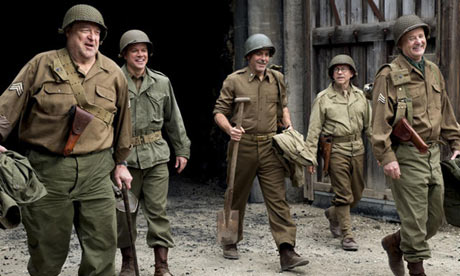
George Clooney's latest directorial endeavour â€" a putative second world war thriller about a special US army unit dedicated to rescuing art works looted by the Nazis â€" has landed with a thud and a splutter at the Berlin film festival. You might expect audiences here to be a tad sensitive about films portraying their compatriots as irredeemable civilisation-destroyers, but that's actually the least of The Monuments Men's problems. Filled with unearned patriotic sentiment, sketchy to the point of inanity, and interrupted every few minutes with neurotic self-justification, this displays none of the nimble-witted sleight of hand, nor indeed old-fashioned suspense, of Argo, the last historical caper movie with which Clooney was involved.
Part of Clooney's difficulty may well be the sheer size of the operation he is attempting to render in cinematic form. Over 300 personnel were involved in the real life Monuments, Fine Arts, and Archives mission, which recovered some five million works; the film reduces them to seven individuals, of which two are non-Americans â€" included, presumably, to reflect the international make-up of the effort. Even so, The Monuments Men shifts so rapidly from place to place, art gallery to cathedral, museum to storage pit, that its human contingent remain ciphers. This is despite a strong cast that includes Matt Damon, Bill Murray and John Goodman â€" chosen, no doubt, for their high-impact value. Cate Blanchett, on the other hand, is badly served with a thin role and saddled with a terrible accent as a Parisian curator-cum-resistance operative, and this normally superlative performer is entirely wasted.
Moreover, as the film ranges far and wide, over relatively complex art-history issues, Clooney and his co-writer Grant Heslov feel the need to explain VERY CLEARLY AND SLOWLY exactly what is happening, where the soldiers are headed, and indeed the specific contribution to human civilisation certain high-profile art works are deemed to make. It may have been considered necessary to turn The Monuments Men into a mass-market proposition, but it undeniably puts the brakes on its attempts to generate momentum.
The film does come alive in a couple of scenes, which are precisely the ones extended to a length to enable a bit of dramatic interaction, and allow for more than a couple of lines of traded dialogue. There's one where two of the monuments men rumble a high ranking Nazi with a farmhouse full of stolen paintings; another when a racehorse grazing in a field conceals potentially lethal danger. These are the only real traces of the kind of entertaining sleight-of-hand that sustained Argo, as well as another, earlier film that pioneered the wartime art-heist theme: John Frankenheimer's The Train, which revelled in the deceptions with which the resistance outwitted their foes.
All this certainly reinforces the point that The Monuments Men is an action movie with very little action, and a caper movie with precious little capering. Clooney is certainly an able director – even a brilliant one on occasion, as Good Night, and Good Luck demonstrated; he has tried to make a big old fashioned war epic, but in the end has got little bang for his buck.
• Ten things we learned from George Clooney's Reddit AMA

